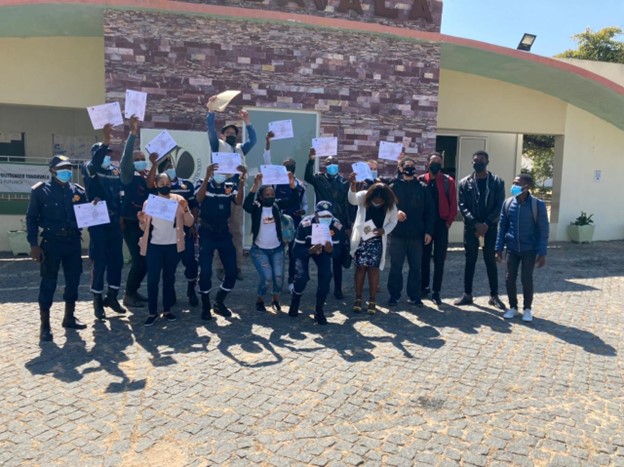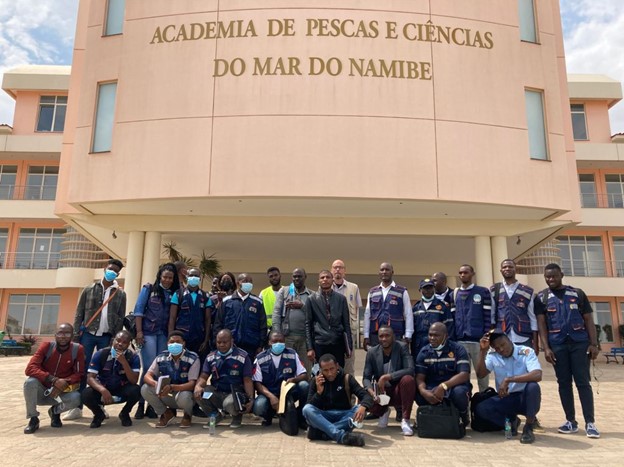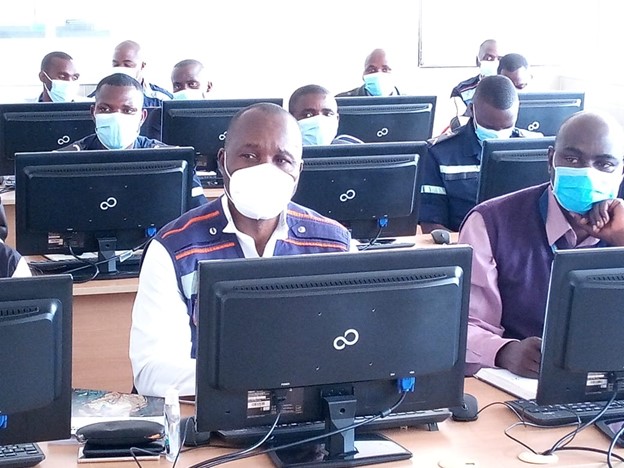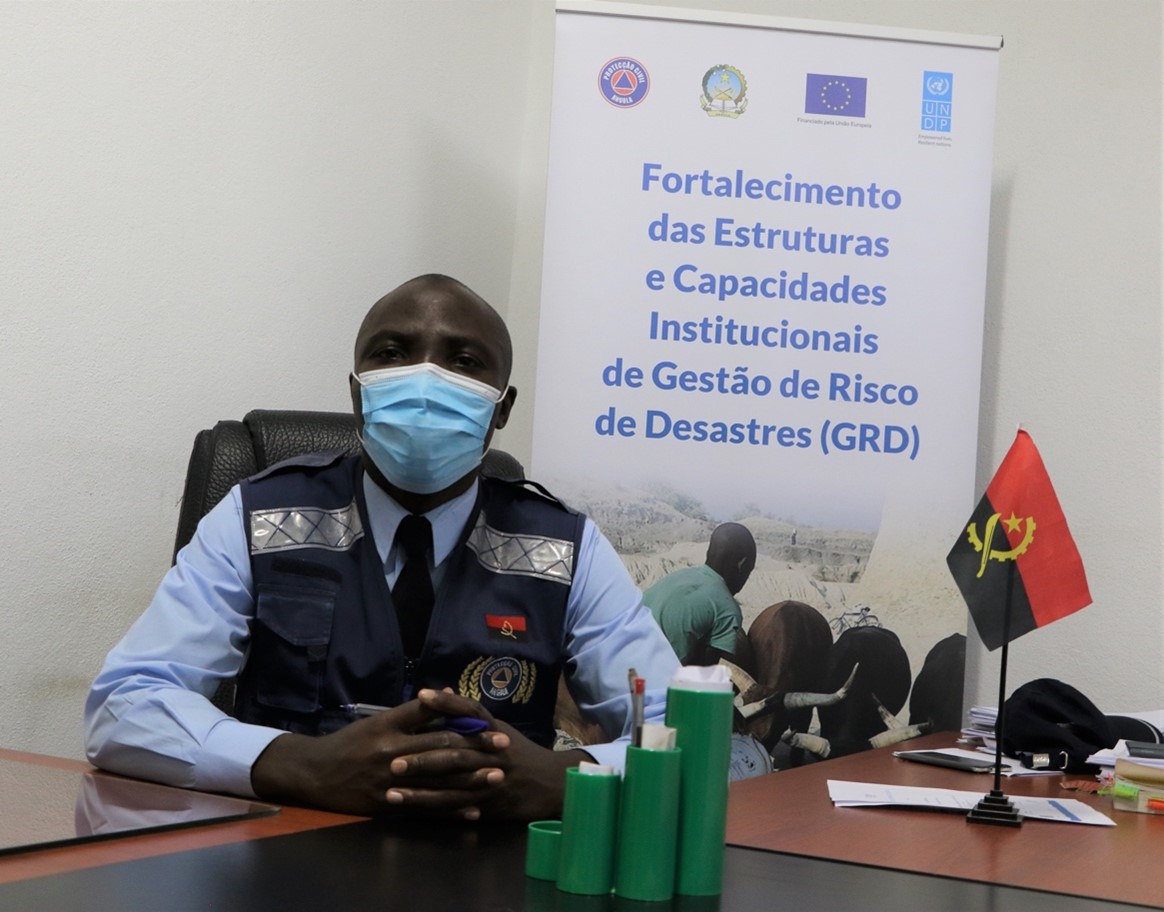 Strengthening Disaster Risk Management Institutional Frameworks and Capacities
Addressing the root causes of vulnerability and structural factors of socioeconomic stress in vulnerable communities
Strengthening Disaster Risk Management Institutional Frameworks and Capacities
Addressing the root causes of vulnerability and structural factors of socioeconomic stress in vulnerable communities

Challenges
The climate variability in Angola is characterized with periods of lack of rain or excess of rainfall. This, combined with other high vulnerability conditions, results in an almost permanent disaster situation, or a cycle of droughts and floods episodes, in the southern region of Angola. Climate change is also exacerbating this chronic disaster risk situation.
Reducing disaster risk, and thus adapting to climate change and variability, is highly relevant for the southern region and for the country. Working on the causes of vulnerability implies addressing structural factors of socioeconomic stress in the communities, which will represent a direct contribution to sustainable development at both local and national levels. The main risk factors are taken into account in sectoral development priorities, such as poverty reduction, gender equity, food and nutrition security, water management and others. It is also key to addressing political and institutional vulnerability, which includes lack of governance capacities at different levels, limited knowledge and misperceptions about disaster risk.
Towards a Solution
This UNDP Project on “Strengthening Disaster Risk Management Institutional Frameworks and Capacities,” is part of the EU-financed FRESAN (Strengthening Resilience and Food and Nutrition Security in Angola) Programme that aims at addressing the underlying causes of food and nutrition insecurity and Disaster Risk Management (DRM) and Climate Change Adaptation in a comprehensive way, focusing on the institutional and organizational vulnerability factors that were pre-identified.
2019 marked the start of the UNDP FRESAN project. This project builds on previous work by UNDP that it started in 2012 with the National Civil Protection System, particularly with the intersectoral National Civil Protection Commission (CNPC).
Since 2012, UNDP has been assisting in enhancing the capacity of the National Civil Protection System, particularly that of the intersectoral CNPC for DRM and resilience building at national and decentralized levels. In 2019, the UNDP FRESAN project has continued with these efforts using a twofold strategy:
- Development of technical capacities of Provincial Civil Protection Commissions (CPPC) in DRM and resilience-building.
- Reinforcement of resilience capacities for early warning in vulnerable communities and in those most exposed to climate fluctuations.
The project has supported the three target provinces of Cunene Huila and Namibe in producing six contingency plans for disasters affecting the region. The Project employs South-South and Triangular cooperation to support the development of DRM institutional capacities and frameworks in Angola:
- Seven key Angolan Civil Protection staff (from the three target provinces) have benefited from an International Labour Organization training course on DRM and Sustainable Local Development every year for four years. This course provides a platform for South-South and Triangular cooperation and a global network of DRM practitioners, including those from Latin American and African countries. The Deputy Commander of Civil Protection and Firefighters of Huila attended the course and noted that it was during the training and the exchange with colleagues from the Chiapas region in Mexico that the initiative in creating Disaster Risk Reduction Committees in Huila province first arose, thereby learning from Chiapas’ successful approach of creating DRR committees.
- The project has supported groups of technical staff from Angolan Civil Protection, including three key staff from the project target provinces in Angola (Cunene, Huila and Namibe), to attend the Master's course in Comprehensive Risk Management and Civil Protection in the "Escuela Nacional De Protección Civil" in Mexico, Campus Chiapas. Chiapas is considered a global learning centre and has pioneered the approach of creating community DRR committees that the Civil Protection and UNDP want to replicate in Angola.
- The exchange of experience with Mexico in decentralized DRM and local early warning systems has facilitated several South-South experience replication visits to the National Commander of Civil Protection to Chiapas, Mexico, as Chiapas is one of the pioneers in this type of strategy of creating DRR communities. In 2021, facilitated by UNDP, a formal Memorandum of Cooperation was signed and is being finalized with the Secretary of State for Civil Protection of Chiapas, Mexico.
In August 2021, two Angolan civil protection senior staff visited Chiapas, and they also attended the master’s course. They worked with the Secretary of State for Civil Protection of Chiapas to obtain further contributions and to improve the Memorandum of Cooperation, as well as to obtain support in the design of the implementation of Local Disaster Risk Management Committees in Angola. As a result, knowledge from Chiapas is being applied and replicated in the creation of DRR community committees in Angola – already 14 communities have been created and trained in Cunene province and 8 more are ongoing.
A key element for the Project’s success is the solid partnerships at both international and national levels. As recognized through previous experiences, both “whole-of-government” and “whole-of-society” approaches are needed to address human needs in disaster-prone communities, thus intersectoral collaboration and partnerships continue to be critical.
In order to promote sustainability of the results delivered under the Project, the Project is implemented to enhance the already existing national and provincial systems and mechanisms, while avoiding the creation of unsustainable add-on parallels. From the beginning, the project promotes national and provincial leaderships and ownerships of DRM-related interventions. The approach foresees a transition of such interventions to an autonomous DRM structure and a strategy to upscale the interventions of the project in the southern provinces to other provinces of Angola.
The project contributes to the implementation of SDGs 1, 2, 11, 13 & 16; the LDC Graduation Strategy of Angola, the Sendai Framework for DRR 2015-2030, and several national strategies: Angola’s Intended Nationally Determined Contribution (INDC) in the framework of the National Strategy for the Implementation of UNFCCC and the Kyoto Protocol, the National Strategy for Climate Change 2018-2030, the Strategy to Fight Poverty (SFP), the National Adaptation Programme of Action (NAPA) and Long Term Strategy for Development of Angola (2025).
Contact Information
Countries involved
Supported by
Implementing Entities
Project Status
Project Period
URL of the practice
Primary SDG
Primary SDG Targets
Secondary SDGs
Secondary SDG Targets
Similar Solutions
| NAME OF SOLUTION | Countries | SDG | Project Status | |
|---|---|---|---|---|
Adaptation for Smallholder Agriculture Programme Establishing better working conditions for smallholder farmers through the use of good practices and new technologies |
Angola, Mexico | 08 - Decent Work and Economic Growth 11 - Sustainable Cities and Communities 13 - Climate Action 15 - Life on Land | Ongoing | View Details |
ADAPT PLAN in Malawi |
Angola, Mexico | 01 - No Poverty 05 - Gender Equality 11 - Sustainable Cities and Communities | Ongoing | View Details |
Addressing Racial and Ethnicity-based Discrimination and Strengthening the Protection of Rural Afro-descendants UNFPA supports data disaggregation as a tool to fight racism and ethnic discrimination |
Angola, Mexico | 01 - No Poverty 02 - Zero Hunger 03 - Good Health and Well-being 05 - Gender Equality 06 - Clean Water and Sanitation 11 - Sustainable Cities and Communities 16 - Peace and Justice Strong Institutions | Ongoing | View Details |
ADELANTE Triangular Cooperation European Union – Latin America and the Caribbean |
Angola, Mexico | 10 - Reduced Inequalities | Ongoing | View Details |
Advanced International Training Programme on Municipal Finance and Local Democracy across Five African Countries Pioneering the proof of concept that greater impact in capacity development for local governments requires a hybrid of methodologies to unlock resource flows |
Angola, Mexico | 01 - No Poverty | Ongoing | View Details |




